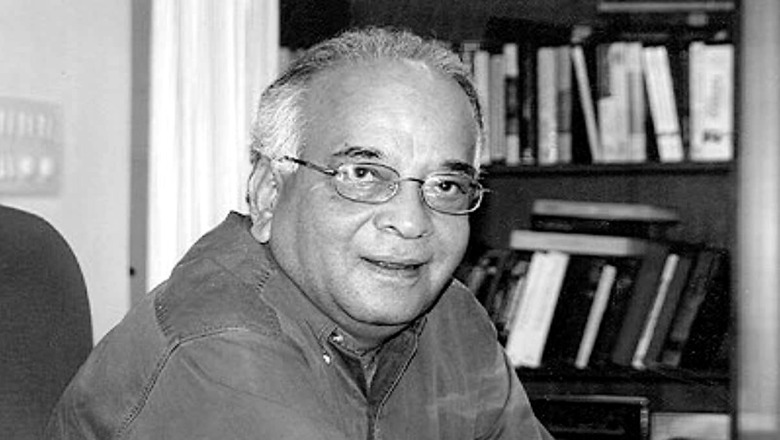
views
This is the partial story of Mushirul Hasan, set in the tumultuous 1990s. It is also an archetypal story and an illustrative lesson, more relevant today than in that period, as we shall see.
Mushirul Hasan passed away in 2018, five years after a four-decade-long career as an academician came to an undignified end when he was forced out of Jamia Millia Islamia on charges of “dereliction of teaching duties.” He was sacked from his job.
Hasan provides a first-person account of the real story behind his sacking. It was a dirty drama that was scripted elsewhere: “The Jamiat Ulama-e-Hind, the Jamaat-e-Islami, and Ittehadul Muslimeen went after me… [I was] accused of eroding Jamia’s minority character by appointing Hindu academics.”
But then, there was simply no other way that it could have ended for Mushirul Hasan. The origins of this ungodly climax date back to 1992, months before the disputed structure in Ayodhya fell. In fact, when the Hasan story was germinating, nobody had an inkling that the disputed structure would be brought down.
It all began when Mushirul Hasan issued a public condemnation against Rajiv Gandhi, who caved into the pressure of the Muslim Ulema and banned Salman Rushdie’s The Satanic Verses.
The obvious consequences followed. Instantly.
Overnight, Mushirul Hasan became the target of a diabolical, no-holds-barred campaign of focussed hatred. Abdullah Bukhari, the then Imam of the Delhi Jama Masjid issued a fatwa against Hasan: “Anyone who defends Salman Rushdie is defiling Islam.” The tone and message of the Imam was unambiguous: by defending Rushdie, Hasan has committed apostasy. Hasan’s students at the Jamia Milia immediately took the cue and swung into action. On the campus, mobs of Muslim students launched into a sloganeering spree, hollering, “Qaum ka gaddar, Maut ka haqdar!” (The traitor to the Muslim community has earned the right to be killed). Days later, Mushirul Hasan was physically assaulted by the same student mob. What was worse was the fact that the management of the Jamia Milia told him that it could not guarantee his safety.
When Mushirul Hasan ultimately saw the writing on the wall, he issued an apology. But it was too late. A parallel drama was also developing.
Hindu secularists had found in Mushirul Hasan the ideal Muslim progressive liberal that they were so desperately seeking. However, they did not openly come out in his defence because his own community was baying for his blood.
Two reasons explain the refusal of these wizened Hindu secularists and liberals to stand by Mushirul Hasan. Let’s look at the second reason first. With due respect to his memory, Mushirul Hasan epitomises the myth of the liberal Muslim or Muslim liberal.
The first reason is explained by the contemporary sage, the late Ram Swarup, in a penetrating essay that he wrote a month after Hasan was targeted. Titled Swords to Sell a God, it was published on June 16, 1992, in The Telegraph. Ram Swarup’s exposition is a brilliant model that shows how contemporary issues must be examined on the touchstone of philosophy.
He directly gets to the heart of the matter. “Did Mr Hasan badly miscalculate? Did he not realise the moral pressures under which he was working? Or, did he think he could brazen it out and earn an instant reputation as a liberal and a progressive without having to pay a price for it? Whatever his compulsions, the episode has proved again that there are not many Muslim liberals around, that they have to work under great pressure, and that though they might establish their credentials cheaply among Hindu secularists, they will have to work at a more fundamental level to deserve it.”
Then Ram Swarup sets about clinically dismantling the unclothed hoax known as Indian secularism. “The Jamia Millia controversy offered its own dilemma to India’s secularists who have a close alliance with Islamism. The alliance works under a veneer of liberal-sounding slogans. But when the Muslims themselves are divided, the [Hindu] secularists too are paralysed and take recourse to equivocation. To retain their ideological face, they must appear to support the Muslim liberals, but in practice, they go along with the Bukharis, Ali Mians, Saits and Shahabuddins. The sleight of hand satisfies no party. The Muslim liberals feel let down. The Muslim fundamentalists feel the secularists must follow the lead of mainstream Islam…They expect the Hindu secularists to abandon hypocrisy and own up to the alliance with Islam. The fundamentalists have repeatedly proved that the so-called Muslim liberals do not matter. It is they who represent the authentic voice of Islam. That is, the voice of the Quran and the Sunnah, and Muslim law and history. They expect Hindu secularists to realise this.”
A close reading of the aforementioned lines of Ram Swarup unmasks the secularist farce like few things do. The practical application of this secularism is most glaringly evident in the unconditional Hindu secularist-liberal support to the fundamentalist Muslim clergy in the Ram Janmabhoomi episode. Under the garb of safeguarding the interests of the Muslim “minorities” vis-a-vis the alleged Babri Masjid, a rainbow coalition of this group embarked on a sickening train of wrecking societal harmony. Topping this list were Communist ideologues who called themselves Marxist historians. Their names are familiar, thanks to the infamy they scripted with their own hands: Irfan Habib, Romila Thapar, R.S. Sharma, et al. Their clients precisely hailed from the fundamentalist Muslim clergy — i.e., the Bukharis and Shahbuddins that Ram Swarup mentions.
What ultimately happened to Mushirul Hasan and what the episode underscores will be narrated in the next part of this series.
To be continued
The author is the founder and chief editor, The Dharma Dispatch. Views expressed in the above piece are personal and solely that of the author. They do not necessarily reflect News18’s views.

















Comments
0 comment